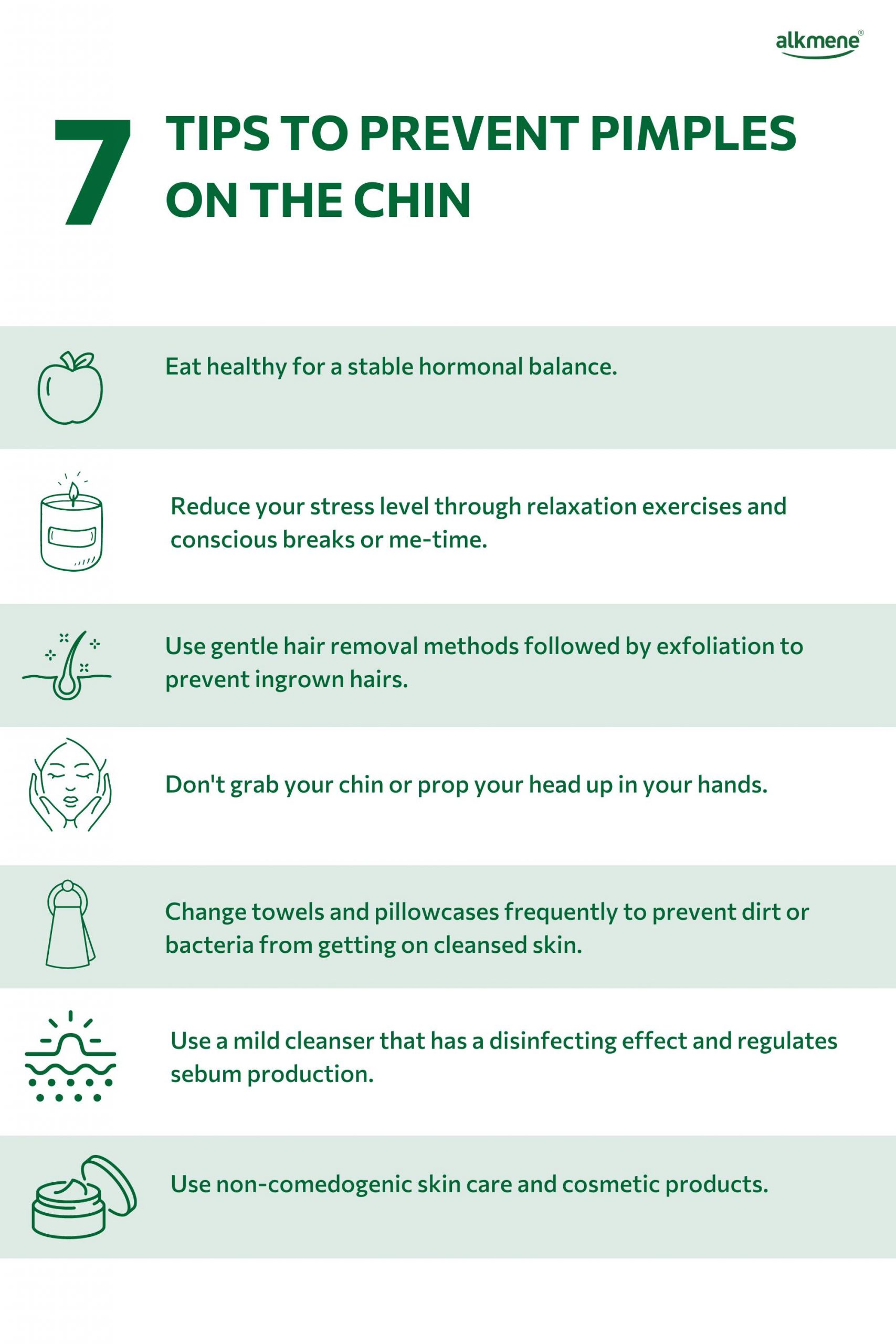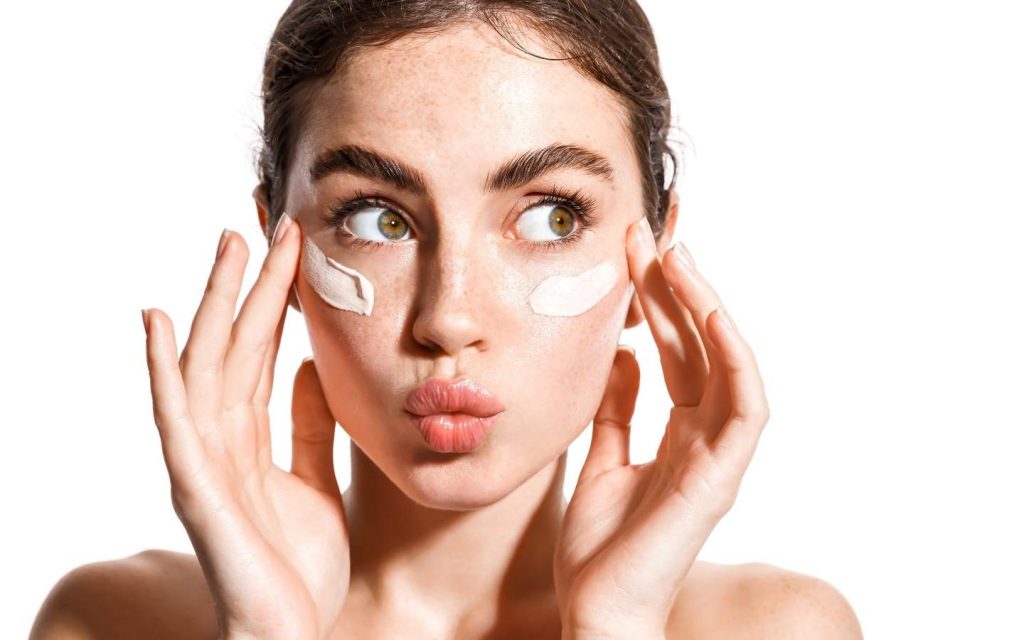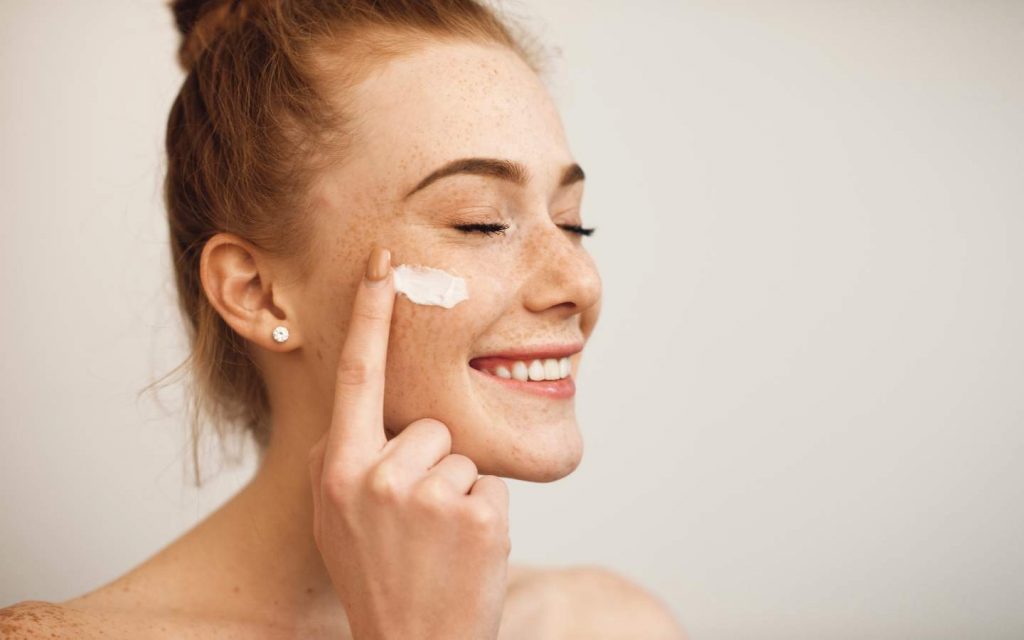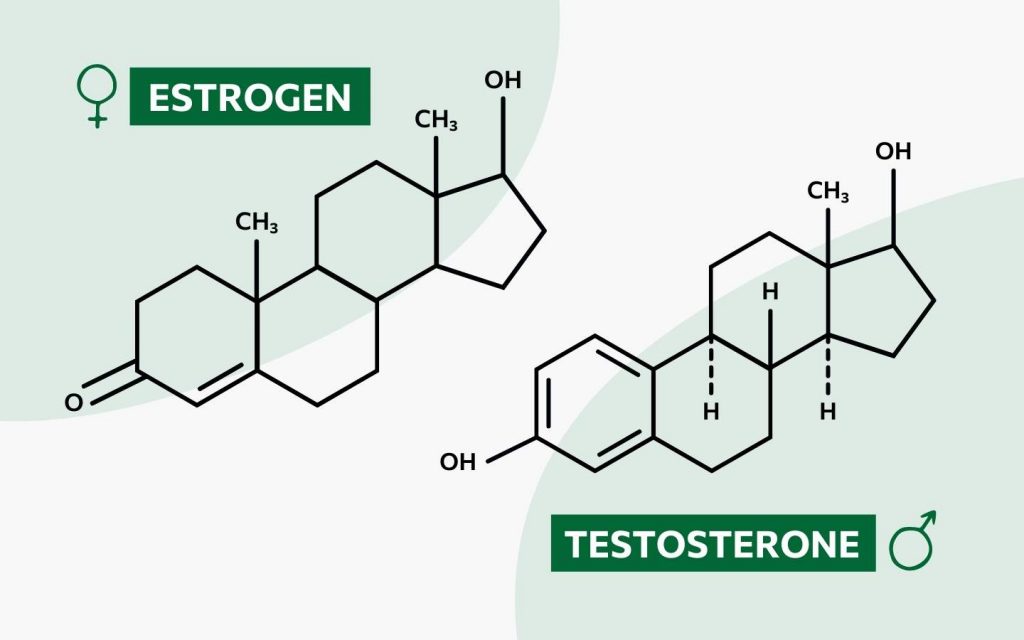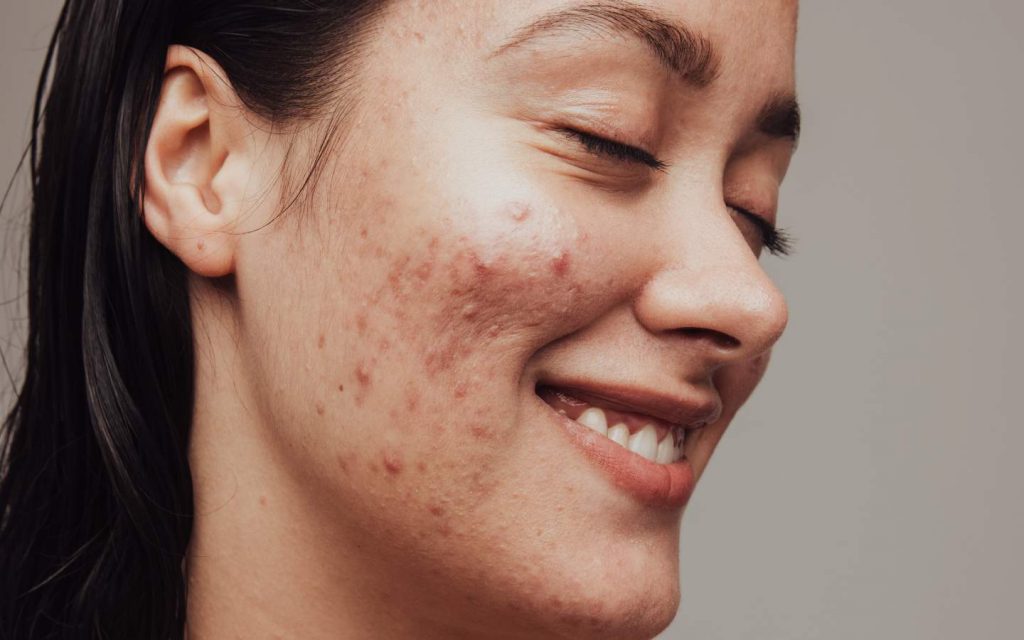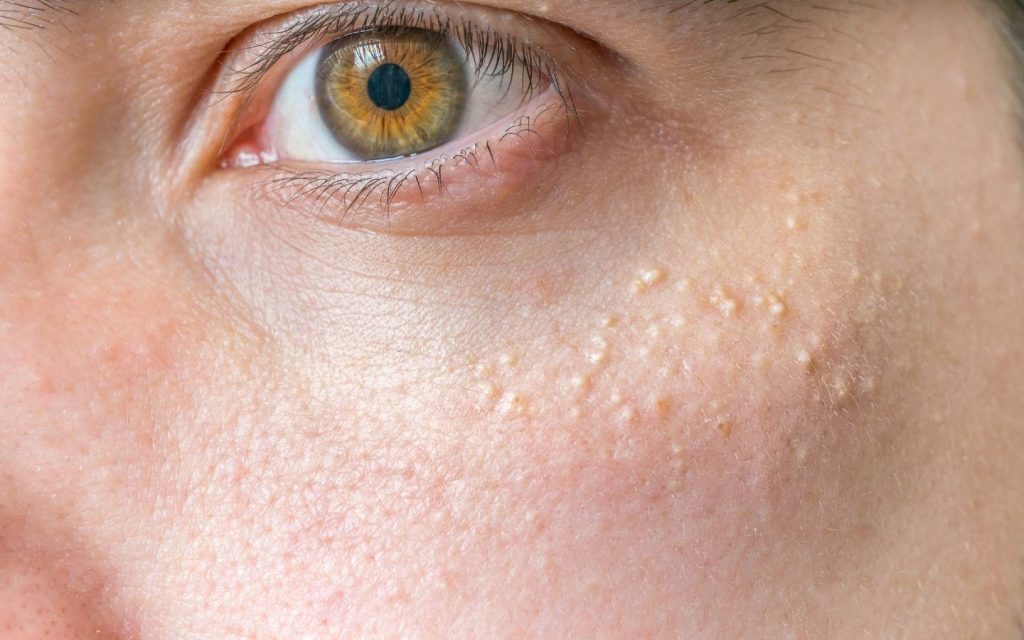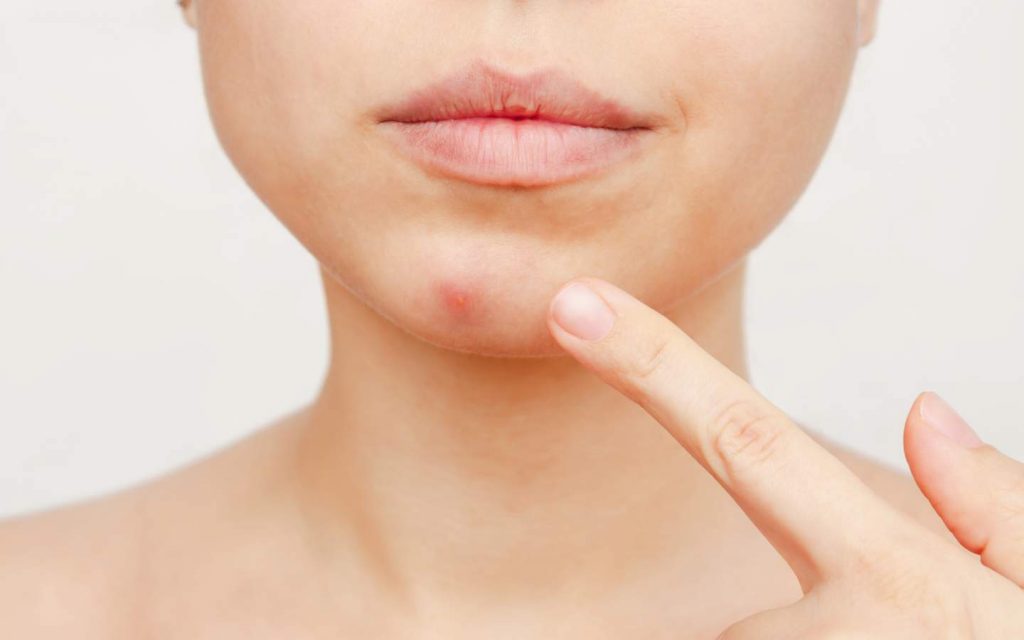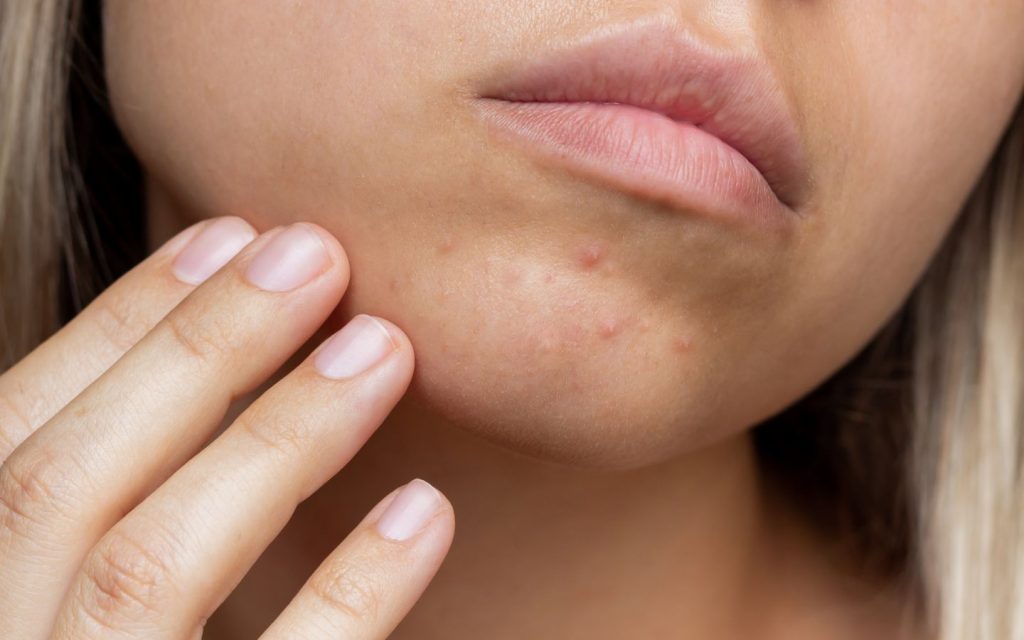
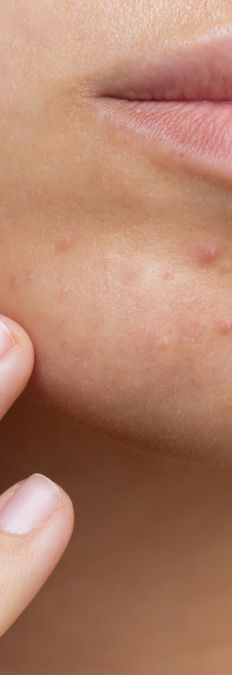
They are not exactly our best friends and yet most of us make acquaintance with them: pimples on the chin. They appear in a wide variety of forms. Small or large pimples, superficial or subterranean pimples, painful or less painful pimples. And the causes of pimples on the chin are just as varied as their appearance – in the following we will explian the causes in detail!
What impurities can appear on the chin?
Sometimes it’s a single pimple on the chin that suddenly appears, other times it’s many small pimples. Our chin is located in the T-zone of the face, an area that is particularly prone to blemishes.
In order to properly treat and prevent blemishes on your chin, you need to know what they are. After all, all degrees of natural blemishes can occur on the chin.
Common blemishes on the chin
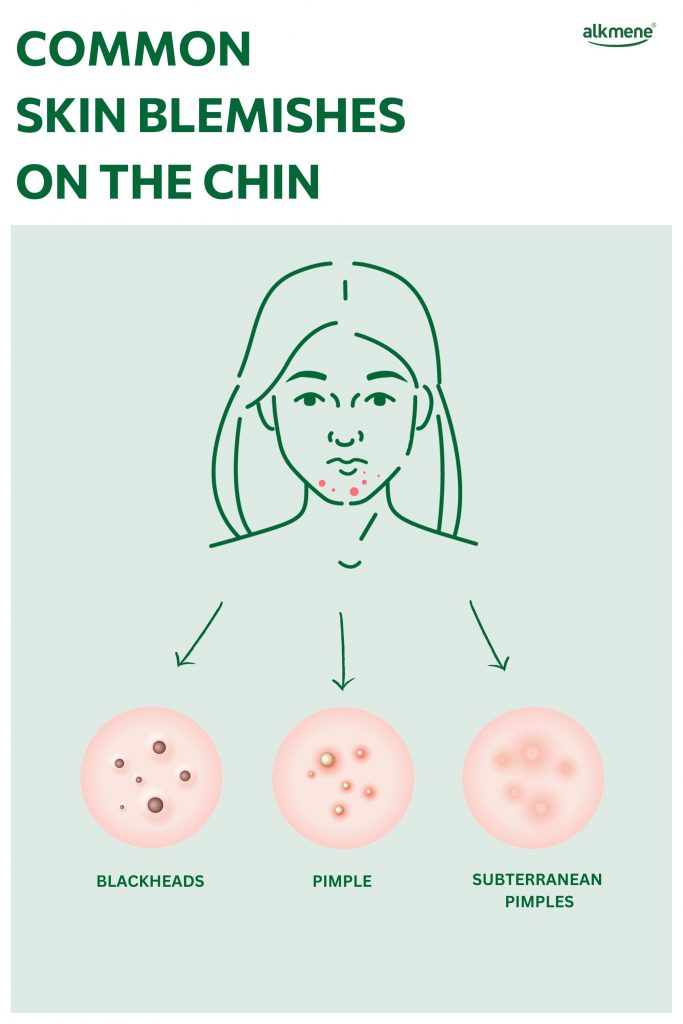
Do you discover isolated, small black or white spots on your chin? Then these are probably blackheads (comedones). The skin is not yet inflamed and does not hurt. However, blackheads can develop into pimples, as the accumulation of sebum makes them the perfect breeding ground for bacteria. However, blackheads should not be confused with follicular filaments, which can also appear as an accumulation of many small spots in the chin area. However, these are not skin impurities – you can find out how to treat follicular filaments here.
Due to an accumulation of bacteria in a clogged pore, it becomes inflamed and pus is formed. Pimples can be recognized as a reddish elevation of the skin, on which a whitish pustule becomes visible after one or two days.
Pimples on the chin can appear in very different sizes and, depending on the size, can also be painful in different ways.
A special feature of the chin area is that deep-lying pimples also frequently occur here, which are colloquially referred to as subterranean pimples. The inflammation of this type of skin blemishes is located in deeper skin layers – they are therefore not always directly visible, but only appear as a slightly reddish elevation. However, if you palpate subterranean pimples on the chin, you can clearly feel the painful lumps.
What are the causes of pimples around the chin
As already mentioned, our chin is located in the T-zone of the face. In this area, skin impurities can occur more frequently, which is due to the fact that there are particularly many sebaceous glands on the forehead, nose and chin. In the case of sebum overproduction, these areas are therefore particularly affected, which is why sebaceous gland blockage and subsequent skin impurities are more likely to occur here.
However, the causes for the development of pimples on the chin can be quite different. We will discuss some of them in more detail below:
One of the most common causes of pimples (on the chin), is a hormonal imbalance. More precisely, the overproduction of male sex hormones, which stimulates and increases the production of sebum. In women, this can be the case, for example, after stopping the pill, during pregnancy or even during menopause.
Pimples on the chin often occur in connection with acne. In this case, the pimples do not appear sporadically, but in increased numbers and over a longer period of time. Acne vulgaris is also called “common acne” and often occurs during puberty – it therefore affects both men and women. The form of acne tarda (late acne), on the other hand, which occurs in adulthood, primarily affects women. It is also a common cause of pimples on the chin, as this form of acne mainly affects the lower part of the face (chin and lower cheeks).
So, if your pimples on the chin appear permanently, it may be acne, the treatment of which should be coordinated with a doctor.
IMPORTANT: If you are not sure whether you already have a form of acne, it is best to make an appointment with your dermatologist. In this way, it can be determined exactly whether and what form of acne it may be and, above all, how you can best treat it.
Stress can also be a trigger for pimples on the chin. Due to the increased production of stress hormones such as cortisol or even adrenaline, sebum production can be increased. This in turn can lead to inflamed blockages of the sebaceous gland follicles, which occurs particularly often in the T-zone (i.e. also on the chin).
According to the face mapping method from traditional Chinese medicine (TCM), the face is divided into nine areas, each of which is assigned one or more organs – the skin’s appearance is thus supposed to provide an indication of health. No organ is directly assigned to the chin area, but the hormonal balance. This therefore coincides with the previously listed reasons for pimples on the chin.
If you shave your face regularly, it is possible that an ingrown hair may occur from time to time. Ingrown hairs are therefore one of the most common reasons in men why pimples appear on the chin. This happens when the hair that grows back cannot penetrate the surface of the skin after shaving. As a result, the skin becomes irritated and painful inflammation such as pimples can occur.
Smoking, unhealthy diet or even low-quality skin care and cosmetic products – it’s no secret that some habits have a bad effect on our skin appearance. Anything that can upset our hormonal balance and thus cause an overproduction of sebum can therefore also be a trigger for blemishes on the chin.
However, a peculiarity of the chin area is the frequent touching of this area. We often support our head with our hand by grabbing our chin. This brings bacteria to the chin area, which find the optimal conditions on sebaceous nutrient medium. This can cause or increase inflammation, especially if pimples already exist on the chin. This habit can therefore not only cause pimples, but also hinder the rapid healing of the inflamed skin areas.
What to look for when you have pimples on your chin?
So that the impurities on the chin soon disappear and do not come back so quickly, you can of course consider a few things. We have collected tips on how to treat pimples on the chin and what you can do to prevent them.
How to treat pimples on the chin?
As always, the three most important rules apply when treating skin blemishes like pimples: Keep your fingers away, cleanse properly and care sensibly.
Keep hands off: Even if you would like to constantly feel whether the pimple is still there or possibly even got bigger, it is important to suppress this urge. Every time you reach for your face and the area of your blemishes, bacteria get there that we definitely didn’t want to be there. Pimples heal best when left alone during the day.
Proper Cleansing: Proper cleansing of skin blemishes is important to remove dirt particles or bacteria that automatically accumulate on the skin. To help the skin regenerate and heal inflamed pimples, it makes sense to use a mild cleanser with a disinfecting effect. Here, our MY TEA TREE OIL deep cleansing wash gel is perfect, as it regulates the sebum flow of the skin and thus prevents the development of further impurities.
Use sensible care: Especially if the skin is already irritated, excessive care should be avoided. Here you should make sure to use non-comedogenic products. Everything you need to know about non-comedogenic products can be found here. Therefore, it is best to use a gentle care product that moisturizes your skin and is not greasy – such as our MY TEA TREE OIL Skin Refining Face Cream.
Otherwise, the key is to be patient until the inflammation subsides and give your skin time to regenerate.
IMPORTANT: These tips apply especially if the pimples on the chin appear only sporadically. If you have more pimples on your chin over a longer period of time, you should discuss the treatment with your dermatologist. In some cases, certain active ingredients are necessary to treat the blemishes on the chin optimally.
How to treat subterranean pimples on the chin
Pimples under the skin occur more frequently on the chin. In many cases, subcutaneous pimples are also particularly painful, although they are often less noticeable. Due to the fact that they are not located on the surface of the skin, but initially in deeper layers of the skin, there is less space and the spreading inflammation causes tension in the skin.
In case of subterranean pimples, you should definitely refrain from trying to squeeze them out or even lance them. This will not make the pimple disappear or heal faster – on the contrary. If you try to remove the pimple in this way, the skin will be more irritated and additional bacteria and other germs can get to the already inflamed area.
Therefore, a lot of patience is required for subterranean pimples. What you can do to do your skin some good is a steam bath. The warm steam opens the pores and can make the pimple come to the surface faster to heal. If you like, you can also add a few drops of our pure tea tree oil. Tea tree oil balances sebum production on the skin while acting as an antiseptic and anti-inflammatory – perfect for helping your skin regenerate pimples on your chin.
Tips to avoid pimples on the chin
